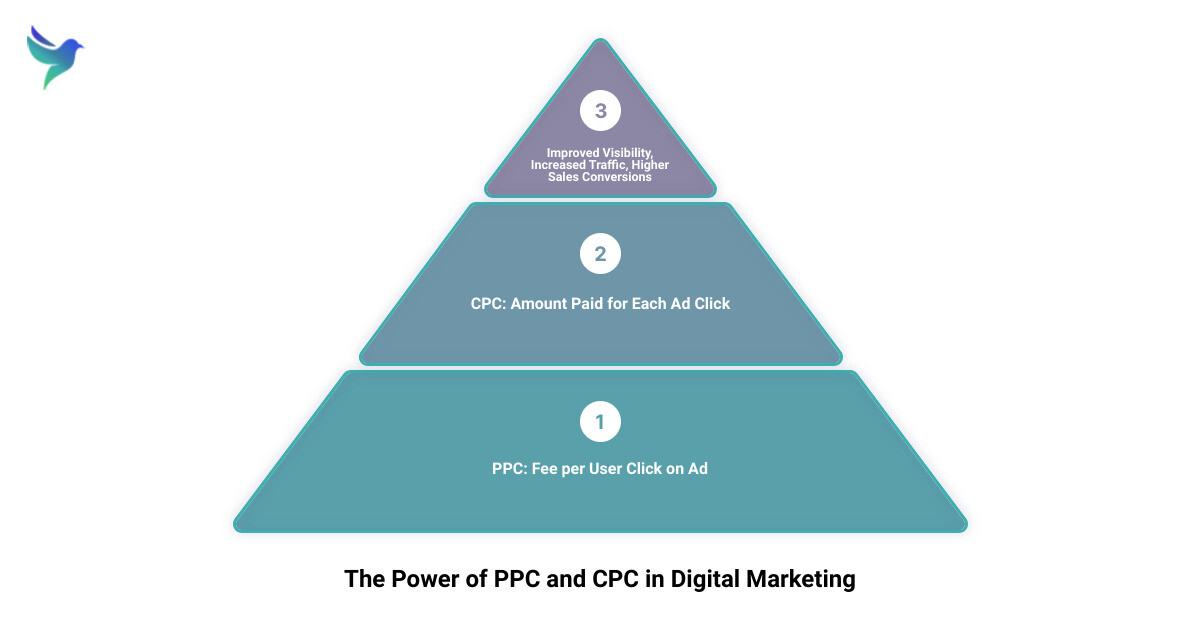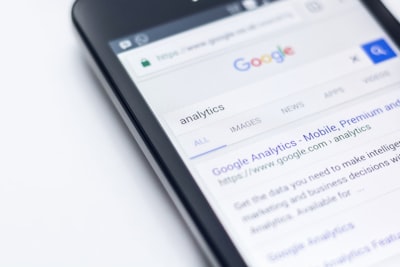In the dynamic world of digital marketing, understanding critical concepts such as Pay-per-click (PPC) and Cost-per-click (CPC) can make the difference between a floundering campaign and a profitable one. As small to medium-sized business owners like yourself, grappling with the complexities of online advertising can turn into an uphill battle. You’re not alone in seeking to decipher these seemingly arcane terms and their implications for your marketing efforts. That’s why we, at Cleartail Marketing, have put together this comprehensive guide to help you unlock the secrets of PPC, CPC, and how to leverage them for a successful online advertising campaign.
To get us started, PPC refers to a marketing model where advertisers pay a fee each time their ad is clicked by a user. On the other hand, CPC is a financial metric within the PPC model representing the amount an advertiser pays per click on their ad. On the surface, these concepts may seem straightforward. Still, taking a deep dive into their intricacies, we uncover layers of importance and strategy crucial to your business’s online success.
At a Glance: PPC vs CPC
- PPC (Pay-per-click): A digital marketing channel where advertisers pay a fee each time a user clicks on their ad. Predominantly offered by top-tier search engines like Google, Bing, and Yahoo.
-
We can see PPC in various forms, but the most common is Google Search Ads.
-
CPC (Cost-per-click): A financial metric within PPC. It denotes the amount an advertiser pays each time a user clicks on their online ad. It is used to measure the cost-effectiveness and profitability of your online ad campaigns.
In the broader context of your online marketing strategy, these concepts serve as vital guideposts steering towards improved visibility, increased traffic, and ultimately, greater sales conversions.

Stay tuned as we delve into the power of PPC, decode CPC, and reveal practical tips to optimize your advertising strategy, boost your online advertising success, and grow your business.
The Power of PPC: Reach, Relevance, and Results
Ready to unlock the secrets of pay-per-click (PPC) advertising? As experts in digital marketing at Cleartail Marketing, we’re here to guide you through the intricacies of PPC and reveal why it’s a powerful tool for businesses seeking to amplify their online presence.
What is PPC and How Does it Work?
Let’s start with the basics. PPC or pay-per-click advertising is a model where businesses pay a fee each time their ad is clicked by a potential customer. The most common form of PPC advertising is Google Search ads, which deliver ads directly to users searching for specific keywords. This makes Google a dominant platform in this space, attracting a vast majority of search inquiries from internet users worldwide.
When a potential customer clicks through a digital ad, the business pays for that click. The interests of these potential customers are documented within a publisher’s database, including records of the websites the customer has visited and their online search history. This valuable data enables the creation of highly targeted advertising campaigns, making PPC one of the most potent advertising channels.
The Role of PPC in Digital Marketing
PPC plays a crucial role in the digital marketing landscape. It’s a powerful tool that allows you to reach a broad audience, increase your brand visibility, and even drive immediate results.
With PPC, you can target potential customers down to their geo-location, historical online interests, age, and more. This means you can focus your marketing efforts on the right people at the right time, making your advertising efforts more efficient and effective.
The Benefits of PPC: Immediate Results and Targeted Exposure
One of the primary benefits of PPC is the immediate results it can deliver. Unlike organic SEO, which often requires time to build momentum, PPC can generate immediate visibility for your brand. This makes it an excellent tool for businesses looking for a quick boost in traffic and sales.
Furthermore, PPC advertising can provide highly targeted exposure. The sophisticated algorithms developed by companies like Google can optimize advertising budgets by referencing unlimited data points. This optimization ensures your campaigns deliver the best return on investment by reaching the right people at the right time.
In conclusion, PPC offers a unique combination of reach, relevance, and results. With its ability to deliver immediate results and targeted exposure, PPC can provide a significant boost to your online advertising success. In the next sections, we’ll delve into the intricacies of Cost Per Click (CPC) and how it plays a role in enhancing your PPC strategy.

Decoding CPC: The Key to Efficient Advertising
As you dive deeper into the world of online advertising, you’ll find that understanding the intricacies of Cost Per Click (CPC) is like finding the magic key to unlock new levels of efficiency in your advertising campaigns.
What is CPC and Why is it Important?
CPC, or Cost Per Click, is the amount an advertiser pays each time a user clicks on their ad. It’s a common metric used across various advertising platforms such as Google Ads, Facebook, and Amazon Advertising. The CPC metric directly affects the financial aspect of your advertising strategy. Simply put, the lower your CPC, the more clicks you can afford, potentially leading to more conversions while staying within your budget.
The significance of CPC extends beyond just cost considerations. It’s closely tied to the value you’re getting from your advertising campaigns. A high CPC can indicate that you’re paying more for each visitor to your site, which may not be sustainable in the long term unless these clicks are converting at a high rate. Conversely, a low CPC can be a sign that your ad campaign is performing well. It’s important to note, however, that the ultimate goal is not just to reduce CPC but to balance it with the quality of clicks and conversions you’re getting.
How to Calculate CPC: A Simple Formula
Calculating your CPC is straightforward. As explained in our source, it’s a three-step process:
- Determine the total cost of your advertising.
- Determine the total number of clicks your ads received.
- Divide the total cost by the total number of clicks.
This will give you the average amount you’re paying for each click. For example, if you spent $1000 on advertising and received 500 clicks, your CPC would be $2.00 ($1000 divided by 500).
Factors Influencing the Cost Per Click
Several factors can influence the CPC of your advertisements. One such factor is the maximum CPC that you as an advertiser set in your Google Ads account. This is essentially the highest amount you’re willing to pay for each click per keyword or group of ads.
The Quality Score, a metric unique to Google Ads, also plays a significant role. This score is calculated based on the expected click-through rate (CTR) of your ad, the relevance of the ad to the search query, and the experience of the web page to which the ad leads. Higher Quality Scores can lead to lower CPCs and better ad positions.
Other factors include the rank of your ad, the competitiveness of the keyword, the search volume for the keyword, and the click-through rate. Each platform will have its own individual factors and standards, leading to different CPC prices for keywords across platforms.
At Cleartail Marketing, we understand the complex mechanics of CPC and how it plays into the success of your PPC campaigns. Our team of experts can help you navigate these factors and optimize your campaigns for better results. In the next section, we’ll explore how CPC and PPC work together in digital marketing and how you can leverage this relationship to boost your online advertising success.

The Intricate Connection Between PPC and CPC
In the fascinating world of digital marketing, PPC and CPC are two acronyms that work hand in hand to drive your online advertising success. They are not only interconnected but are also pivotal factors in creating effective, optimized, and cost-efficient marketing campaigns. Let’s dive deeper into understanding their relationship and how they work together.
How PPC and CPC Work Together in Digital Marketing
Pay-per-click (PPC) and cost-per-click (CPC) are two sides of the same coin in the realm of online marketing. PPC refers to the advertising method where advertisers pay a fee each time their ad is clicked by a user. On the other hand, CPC is a financial metric that measures the cost incurred for each of those clicks.
In other words, PPC is the strategy, and CPC is the performance metric. Together, they provide a comprehensive picture of your campaign’s effectiveness and efficiency. With a well-executed PPC strategy and a keen eye on the CPC, you can boost your ad’s visibility, reach your target audience more effectively, and make the most of your advertising budget.
The Impact of CPC on PPC Campaigns
The CPC has a direct impact on the effectiveness and profitability of your PPC campaigns. A lower CPC means that you are paying less for each click, which can lead to a higher return on investment (ROI). However, a lower CPC isn’t always better. It’s crucial to balance the CPC with the quality of the clicks you’re receiving.
The goal is not just to generate clicks, but to attract potential customers who are likely to make a purchase or engage with your brand. This is where the power of strategic PPC comes into play. By targeting the right keywords and demographics, you can attract high-quality clicks that are more likely to convert, even if the CPC is slightly higher.
Strategies to Optimize the Connection Between PPC and CPC
Effective optimization of the PPC and CPC connection is a game-changer for your online advertising success. Here are some strategies that we at Cleartail Marketing recommend:
-
Keyword Research: The foundation of any successful PPC campaign lies in keyword research. Identify the keywords that your target audience is using and incorporate them into your PPC ads.
-
Quality Score: Google rewards advertisers who create relevant, high-quality ads with a high Quality Score. This score can significantly reduce your CPC and boost your ad’s visibility.
-
Bid Optimization: Adjust your bids based on the performance of your ads. If a keyword is performing well (i.e., leading to conversions), it may be worth increasing your bid to secure a higher ad position.
-
Landing Page Optimization: The page your visitors land on after clicking your ad plays a crucial role in their decision to convert. Ensure your landing pages are relevant, user-friendly, and optimized for conversions.
-
A/B Testing: Run tests on different elements of your PPC ads (like headlines, descriptions, calls to action) to determine what works best for your audience.
By leveraging these strategies, you can optimize the connection between PPC and CPC, making your online advertising endeavors more efficient and effective. Remember, the goal is not just to generate clicks, but to attract high-quality clicks that lead to conversions.
At Cleartail Marketing, we understand the intricate connection between PPC and CPC, and we’re here to help you navigate this complex landscape. Our team of experts can help you create a customized strategy that maximizes your ROI and accelerates your business growth.

Comparing CPC with Other Advertising Metrics: CPM and RPC
In the world of digital marketing, there are several key performance metrics used to measure the efficiency of advertising campaigns. While Cost Per Click (CPC) is a crucial metric, it’s not the only one. Let’s take a closer look at Cost Per Mille (CPM) and Revenue Per Click (RPC) and see how they compare to CPC.
Understanding CPM: Cost Per Mille or Thousand Impressions
CPM, which stands for “cost per mille,” measures the cost of 1,000 ad impressions. This metric is used in advertising campaigns where the goal is to increase brand awareness rather than drive direct clicks or conversions. Unlike CPC, CPM is based on the number of times an ad is viewed, irrespective of whether customers click on it or not. This means brands can still pay for impressions even if no direct interaction with the ad occurs. CPM is often used in display advertising and social media campaigns where the main objective is to reach a large audience.
The Difference Between CPC and RPC: Cost vs Revenue Per Click
While CPC tells you how much you’re spending for each click, Revenue Per Click (RPC) gives you an insight into how much money you’re making from those clicks. Essentially, RPC is a profitability metric and it allows you to measure which campaigns, ads, and sources are generating profits. It’s a great tool for optimizing your advertising spend and making data-driven decisions. The difference between CPC and RPC can provide valuable insights into the effectiveness of your ad campaigns, helping you identify areas for improvement and increased profitability.
Which is Better: CPM or CPC?
Deciding whether to focus on CPM or CPC depends largely on your campaign goals. If your objective is to increase brand awareness and reach as many people as possible, then a CPM model might be more appropriate. However, if your goal is to drive targeted traffic to your website and you’re looking for a more direct correlation to purchases made by customers, then CPC is the way to go.
At Cleartail Marketing, we believe there’s no one-size-fits-all approach to digital marketing. It’s all about finding the right balance and utilizing a mix of metrics to achieve your specific business goals. Whether you’re aiming for increased visibility with CPM, targeted engagement with CPC, or maximizing profitability with RPC, we’re here to guide you through the process.
In the end, understanding the relationship between these metrics can help you make more informed decisions about your advertising spend, ultimately leading to a more efficient, effective, and profitable marketing strategy.
Practical Tips to Lower Your CPC and Boost PPC Performance
So, you’ve comprehended the fundamentals of PPC and CPC, and you’re ready to propel your digital marketing strategy to new heights. Now, let’s delve into the practical aspects. We at Cleartail Marketing have compiled some top tips to help you decrease your Cost Per Click (CPC) and enhance your Pay Per Click (PPC) performance. Remember, a lower CPC can indicate a more successful ad campaign, driving more traffic to your website without draining your advertising budget.
How to Effectively Set Your Maximum CPC
The first step to lower your CPC is to set an effective maximum CPC. This is the highest amount you’re willing to pay for each click on your ad. But how do you decide what that maximum should be? It all comes down to understanding your profitability per conversion and how much traffic you expect your ad to generate.
Start by determining your profit margin on the product or service you’re advertising. Then, estimate the conversion rate of your ad—how many clicks will result in a sale? Divide your profit per conversion by your conversion rate to find your break-even CPC. This is the maximum you can pay per click without losing money on your ad. Remember to review and adjust your maximum CPC regularly, as market conditions and your business goals evolve.
The Role of Quality Score in Reducing CPC
Google Ads employs a metric called Quality Score to measure the relevance and overall quality of your ads. As the source explains, Quality Score is a composite of your ad’s expected click-through rate (CTR), the relevance of the ad to the search query, and the user experience of the landing page your ad leads to.
A higher Quality Score can lead to lower costs and better ad positions. Therefore, focusing on improving your Quality Score can significantly reduce your CPC. This can be achieved by ensuring your ads and landing pages are highly relevant to the user’s search intent, and by continuously optimizing your ad copy and landing pages to improve your click-through and conversion rates.
Techniques to Optimize Your PPC Campaign for Lower CPC
Reducing your CPC isn’t just about setting your bids and improving your Quality Score—it’s also about optimizing your entire PPC campaign. Here are some techniques we at Cleartail Marketing recommend:
-
Keyword Selection: Choose keywords that are highly relevant to your ads and landing pages. Consider using long-tail keywords, which are more specific and often less competitive (and thus less expensive) than more common keywords.
-
Ad Scheduling: Run your ads at times when your audience is most likely to see them and take action. This can increase your click-through rate, which can in turn improve your Quality Score and lower your CPC.
-
Location Targeting: If your business only serves certain areas, make sure your ads are only showing to people in those locations. This can help prevent unnecessary clicks that cost you money but don’t result in conversions.
-
Continuous A/B Testing: Regularly test different versions of your ads and landing pages to see which ones perform best. Keep the winners, discard the losers, and keep testing. This continuous improvement can help lower your CPC over time.
By applying these practical tips and techniques, you can effectively lower your CPC and boost your PPC performance, making your online advertising campaigns more efficient and profitable. At Cleartail Marketing, we have the expertise and experience to guide you every step of the way. With our help, you can master the intricacies of PPC and CPC and drive your business to online advertising success.
Conclusion: The Path to Successful Online Advertising with Cleartail Marketing
Navigating the landscape of online advertising can be tricky. But with the right expertise and guidance, you can leverage powerful tools like PPC and CPC to your advantage. At Cleartail Marketing, we’re committed to helping you master these strategies and steer your business towards online advertising success.
How Cleartail Marketing Can Help You Master PPC and CPC
As a business owner, you’re constantly juggling multiple tasks and responsibilities. Learning the ins and outs of PPC and CPC might seem like another daunting task to add to your already long to-do list. But that’s where we come in. We at Cleartail Marketing take the complexity out of online advertising.
Our team of experienced professionals understands how to design and implement effective PPC campaigns that align with your budget and business goals. Furthermore, we can help you understand and manage your CPC, ensuring that you’re getting the most bang for your buck in your online advertising efforts.
The Cleartail Marketing Advantage: Experience, Results, and Strong Client Relationships
At Cleartail Marketing, we pride ourselves on three key pillars: experience, results, and strong client relationships. With years of experience in the digital marketing industry, we have a deep understanding of PPC and CPC and how they can be used to drive online advertising success.
Our results speak for themselves. We’ve helped numerous businesses just like yours to increase their online visibility, attract more potential customers, and boost their sales. And we do all this while maintaining strong client relationships. Your success is our success, and we’re committed to working closely with you to achieve your online advertising goals.
Final Thoughts on the Power of PPC and CPC in Boosting Your Online Advertising Success
The power of PPC and CPC in online advertising cannot be overstated. These tools offer a strategic, focused, and cost-effective way to reach your target audience and drive traffic to your website. By understanding and effectively managing your PPC and CPC, you can enhance your online visibility, attract more potential customers, and ultimately, boost your sales.
At Cleartail Marketing, we’re here to help you unlock the secrets of PPC and CPC and boost your online advertising success. Whether you’re new to online advertising or just looking to optimize your current efforts, we have the expertise and solutions to help you succeed. Let’s work together to turn your online advertising goals into a reality.




